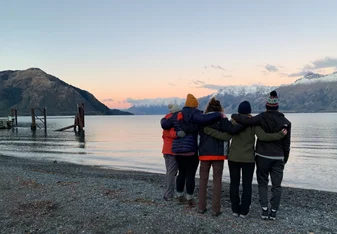Volunteer in Guyana
Whether you enjoy hiking through challenging, yet pristine landscape on a rainforest trek, or people-watching in one of Georgetown's bustling markets, Guyana offers more than enough options to keep you busy! Beyond its beauty, however, lies a host of challenges, and Guyana is still considered one of the poorest countries in the Caribbean Commonwealth (and in the Western Hemisphere as a whole).
Guyana suffers from a lack of skilled human resources, and high emigration rates are only making matters worse. There are many important initiatives in Guyana that volunteers have the opportunity to get involved with!
Health
Many of Guyana's interior villages are very remote, and in some cases, even inaccessible by road. As a result, there are limited medical facilities for the residents of these villages. Volunteers could be part of a team providing health, dental, or eye care to these villages by air.
Community Development
Many Amerindian communities are beginning to consider tourism as a means of income. Volunteers could help local community members or leaders to develop sustainable tourism models that focus on the importance of conservation and protection of their lands.
Youth Support/Development/Education
Many schools in Guyana are frequently under-staffed and suffer from a lack of resources and inadequate infrastructure, meaning that many children aren't getting the quality education they deserve. Volunteers can help teach classes, run literacy workshops, or just spend time reading to children.
Gender Equality
Alcohol abuse and domestic violence negatively affects the lives of many Guyanese families, especially in Amerindian villages throughout the interior. Volunteers could take on projects that empower women in these situations or educate the public on the negative impacts of substance abuse.
Environment
With approximately 80% of Guyana's landmass being covered in tropical rainforest, there is no shortage of rainforest conservation and development projects, as well as research opportunities for volunteers to get involved with. Wildlife and habitat conservation, research, and education projects also exist.
Volunteering Tips
Volunteer Support: Most organizations who send volunteers abroad will have some sort of support system in place, in the form of field staff, an orientation program, or a hotline to provide volunteers with support and answer questions, for example. When possible, volunteers should also register their travel plans with their government's Foreign Affairs department in order to stay connected to their home country while abroad and be informed of any emergencies. Many Embassies or High Commissions, including UK, USA, and Canada exist in Guyana, and can help visitors with emergencies or immediate needs.
NGO/Nonprofit/Volunteer History: Many NGOs exist in Guyana and work in a variety of sectors including governance, gender issues, human rights, legal affairs, and health. Current opportunities for volunteer placements exist with: Youth Challenge International, WorldTeach, Mercy Volunteer Corps, and Fronteering. Check out WANGO for a complete list of NGOs in Guyana.
Requirements and Things to Know Before You Go: Don't let Guyana's official language status as "English" fool you! Unless you have a talent for quickly picking up Creolese, you can expect to find yourself utterly confused and fairly certain that the locals aren't speaking English at all for the first few weeks of your visit. Don't worry, though! The more time you spend conversing with locals, the more quickly you will catch on. A willingness to learn and an open-mind will take you very far during your stay.
How Volunteering In Guyana Will Help Your Future: You will have the opportunity to challenge yourself daily and to develop skills that will benefit you both personally and professionally. Placing yourself outside of your comfort zone has many rewards. You'll learn new things about yourself and accomplish things you never dreamed you could, all while having the experience of a lifetime!
How to Save Money While Volunteering: The availability of products or services to spend money on vary greatly throughout Guyana. In some remote villages, there may be very little opportunity for volunteers to make purchases of any sort, thereby allowing them to save money by default while on project. Where options do exist, ways to save money include resisting the urge to constantly buy a cold drink (it will prove to be very difficult!), or preparing meals at home rather than purchasing food from local shops. Keep track of how much you are spending and what you are spending on, and budget accordingly. When and where possible, walk instead of taking a bus or taxi, and always scope out the best price for services.
Best Places to Volunteer: Georgetown (the capital), St. Cuthbert's Mission, the Iwokrama, Lethem, the Rupununi, and many remote villages throughout Guyana's interior.
Questions to Ask: Is accommodation provided for volunteers? What kitchen supplies are already provided? What's the weather like? What are the appropriate dress standards? Will airport transportation be provided? If volunteering with an organization, will staff be available to provide volunteers with guidance and support? Take these questions into consideration for the best volunteer experience possible!
Health and Safety of Volunteers in Guyana
Recommended vaccinations before departing for Guyana include: Hepatitis A & B, Typhoid, Yellow Fever, Rabies, Tetanus, and MMR. Entry into Guyana may be refused to travellers who cannot provide proof of vaccination against Yellow Fever. Volunteers may also want to consider taking some form of Malaria pills throughout their stay in Guyana. If traveling with an established organization, this may even be a requirement. Volunteers should be equipped with an antidiarrheal drug such as Cipro, as traveller's diarrhea can often accompany exposure to an unfamiliar diet. Insect repellent, sunblock, and a personal medical kit stocked with all the essentials are necessary items for a visit to Guyana as well. Check out MD Travel Health for further guidelines.
In terms of safety, petty crimes such as theft are probably the most common risks travellers may experience in Guyana, apart from reckless driving. Though crime rates in Guyana are high, most crime occurs along the coast and in Georgetown, and visitors are rarely the target of serious violence. That said, travellers should always remain alert and keep a close watch on their belongings. Remember that using common sense can go a long way in minimizing threat. For more information on travel warnings and recommendations, visit your government's Foreign Affairs website.
Visas for Volunteering in Guyana
Visas are not required for visitors who are nationals of countries including (but not limited to): Canada, USA, UK, Australia and New Zealand. The complete list can be found through the Guyanese government and Visa HQ. Upon entry, visitors of these countries will receive a stamped visa that is valid for up to three months.




